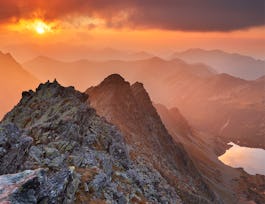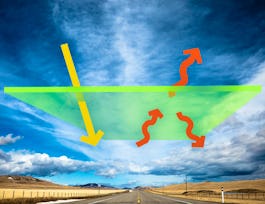Welcome to the American Museum of Natural History's (AMNH) primer called Climate and Climate Change in New Jersey! This primer includes numerous elements that will provide you with an understanding of our climate system and climate change in New Jersey, and encourage you to think about viable solutions for climate change impacts. It is divided into four parts, which may be completed sequentially as it was designed or in your sequence. We estimate that it will take approximately 2.5 hours to complete. We are also happy to inform you that you can receive 2.5 professional development hours and a Certificate of Attendance upon successful completion of this course.



Climate and Climate Change in New Jersey

Instructor: Margaret Holzer
Sponsored by Coursera Learning Team
(14 reviews)
Details to know

Add to your LinkedIn profile
4 assignments
See how employees at top companies are mastering in-demand skills


Earn a career certificate
Add this credential to your LinkedIn profile, resume, or CV
Share it on social media and in your performance review

There are 4 modules in this course
Welcome to the American Museum of Natural History's (AMNH) primer called Climate and Climate Change in New Jersey! This primer includes numerous elements that will provide you with an understanding of our climate system and climate change in New Jersey, and encourage you to think about viable solutions for climate change impacts. It is divided into four parts, which may be completed sequentially as it was designed or in your own sequence. We estimate that it will take approximately 2.5 hours to complete. We are also happy to inform you that you can receive 2.5 professional development hours and a Certificate of Attendance upon successful completion of this course. Below is Part One of our primer (labeled as Week One in the navigation bar). The resources in this part introduce you to the layout of the primer and the basics of our global climate system and New Jersey’s climate system. To guide your learning, we selected “sunny-day flooding” (also called tidal or nuisance flooding) as an anchoring phenomenon. The learning in each part of the primer will reveal another piece of this issue, which is becoming more and more prevalent in our coastal communities here in New Jersey. To begin, Dr. David Robinson, a Professor of Geography at Rutgers University, and the New Jersey State Climatologist, will introduce you to what is in store in a short video.
What's included
2 videos5 readings1 assignment
Before we look into the evidence of climate change, it is important to understand why our climate is changing. In the first video, Dr. Debra Tillinger, an oceanographer, describes the mechanisms causing our atmosphere to warm, and explains why the warming varies around the globe. In the final video of this section, Dr. Robinson provides more information about the evidence for climate change in New Jersey, and helps make the connection between sunny-day flooding and climate change in New Jersey.
What's included
2 videos5 readings1 assignment
Now that we have an understanding of the basics of our climate system and we have explored evidence of global and local climate change, we want to understand what to expect in the future. To do this, we need to explore feedbacks and forcings that move our climate system away from stability. Watch the video “What are Feedbacks and Forcings?”, in which Dr. Tillinger explains how feedbacks and forcings affect the climate system. Understanding these interactions will help us understand the challenges of creating models to predict the future of our climate system. In his third video, Dr. Robinson explains how we monitor the climate system, including sea level rise, in New Jersey. What can we expect to happen to sea levels in New Jersey in the future? Can we expect more sunny-day flooding?
What's included
2 videos2 readings1 assignment
In this final part of the course, we will explore the impacts of climate change in New Jersey, and what can be done about it. In his final remarks, Dr. Robinson wraps up what we know about sunny-day flooding now and in the future, and provides his thoughts about solutions for the climate change impacts in New Jersey.
What's included
1 video3 readings1 assignment
Instructor

Offered by
Why people choose Coursera for their career




Learner reviews
14 reviews
- 5 stars
64.28%
- 4 stars
28.57%
- 3 stars
7.14%
- 2 stars
0%
- 1 star
0%
Showing 3 of 14
Reviewed on Feb 11, 2023
The course is well-taught. We learned about atmospheric warming ,sea level rise, feedback, forcings, climate models, climate prediction, and climate impacts and solutions in New Jersey.
Reviewed on Jul 30, 2022
Informational and easy to see relevance to my current teaching situation. Eye opening to the necessity of not only mitigating but adapting to avoid dire consequeneces of climate change.
Recommended if you're interested in Health

American Museum of Natural History

Banco Interamericano de Desarrollo

The University of Chicago

University of California San Diego

Open new doors with Coursera Plus
Unlimited access to 10,000+ world-class courses, hands-on projects, and job-ready certificate programs - all included in your subscription
Advance your career with an online degree
Earn a degree from world-class universities - 100% online
Join over 3,400 global companies that choose Coursera for Business
Upskill your employees to excel in the digital economy


